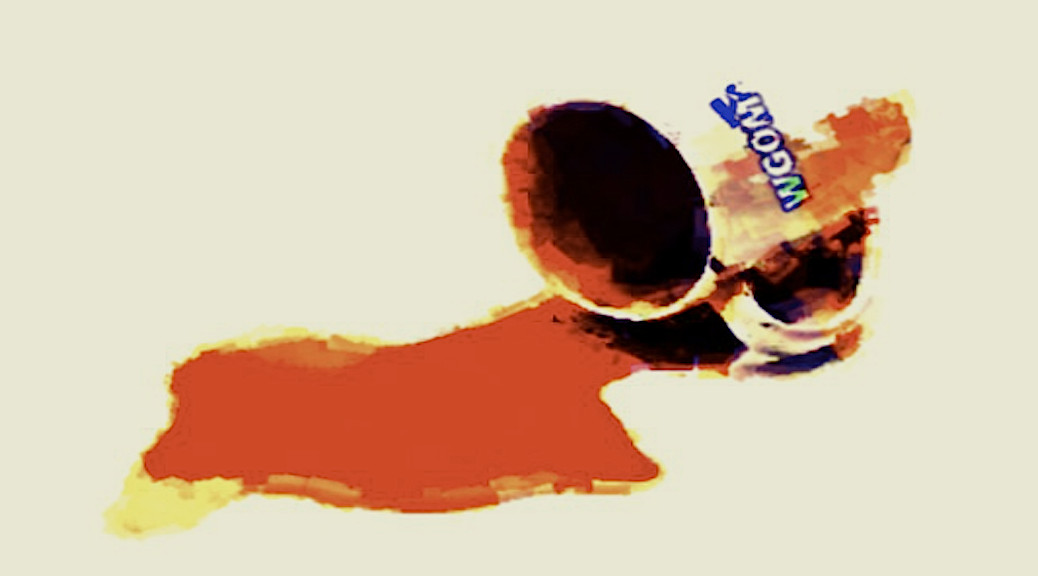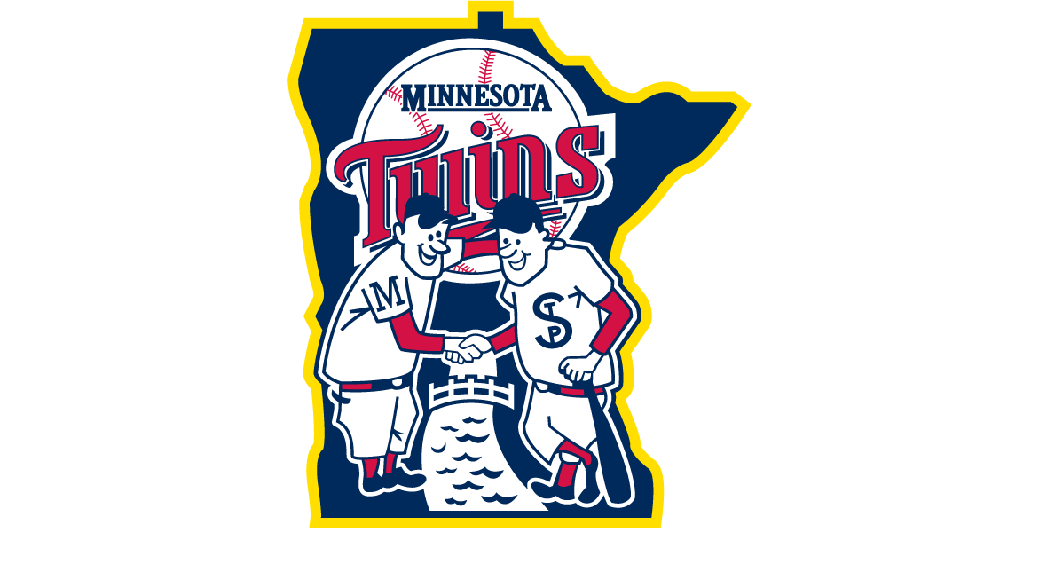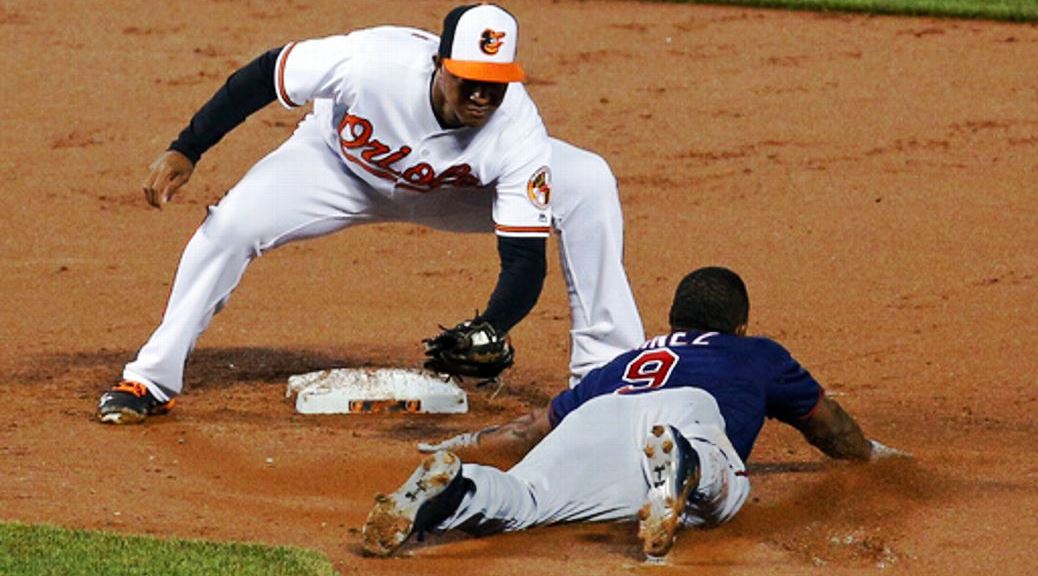We haven't seen any movies in a while but have been catching up on The Americans and keeping up with Game of Thrones. My analysis of both: damn.
All posts by sean
2016 Game 52: Twins at A’s
Finally a game I can watch the ending to in this series.
Pat Dean
v
Sean Manaea
May 23, 2016: Fresh coffee
Apparently the supplies to make a new Cup burned up in the bonfire. Here are some fresh ones.
Losing Consecutively
The Twins starting the season with a nine-game losing streak was not good. Good teams don't lose a lot of games and even more so don't lose them in long streaks. That got me wondering about how teams with losing streaks fared overall.
It was pointed out here that the Twins streak was more noteworthy because it started the season so it looks even worse. Baseball-Reference only allows searching from the beginning of the season if you want to include all teams over all years so that's the best quick investigations can do. In order to search throughout the season, some work needed to be done.
I processed every season in the modern era through last year and grouped all games together by their streaks. A stretch that went WLLWWW would be a one-game winning streak, a two-game losing streak, and a three-game winning streak. Some brief spot checking of last year's data showed the streaks were properly classified. I merged that with the season results for those seasons in order to associate how teams did given a streak of a certain length.
To start, I decided to look at the range of results for teams with at least a losing streak of every length. The full dataset contains every season since 1900. Here are the number of seasons that contained a losing streak of this length from 1900 through 2015.
| 1 | 2 | 3 | 4 | 5 | 6 | 7 | 8 | 9 | 10 | 11 | 12 | 13 | 14 | 15 | 16 | 17 | 18 | 19 | 20 | 21 | 23 |
|---|---|---|---|---|---|---|---|---|---|---|---|---|---|---|---|---|---|---|---|---|---|
| 2117 | 2116 | 2102 | 1896 | 1469 | 1014 | 605 | 377 | 210 | 130 | 73 | 43 | 27 | 19 | 9 | 2 | 4 | 3 | 4 | 4 | 1 | 1 |
First thing that popped out to me was the 2117 seasons with a one-game losing streak but 2116 seasons with a two-game losing streak. I checked the data to find the season, looked it up and determined it was right. If you want to know which team it is, the answer is at the bottom.
I did not want to have to normalize the seasons to match 162-game seasons nor have to deal with seasons shortened by a strike so I processed only the 162-game seasons. Converting that to a box plot for a pretty picture gives us this.
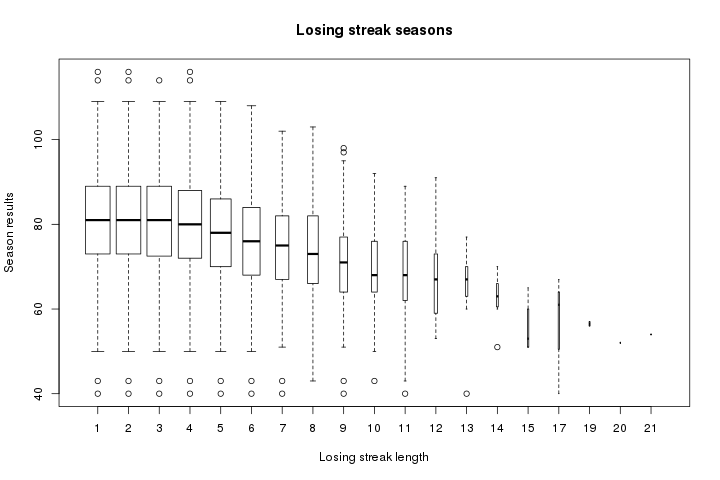
The widths of the box plots represent the number of seasons. The total number of seasons in the data set are 1234. In tabular form it looks like the following.
| Losing streak length | Seasons with that streak | 95th percentile | 75th percentile | Median | 25th percentile | 5th percentile |
|---|---|---|---|---|---|---|
| 1 | 1234 | 109 | 89 | 81.0 | 73.0 | 50 |
| 2 | 1234 | 109 | 89 | 81.0 | 73.0 | 50 |
| 3 | 1232 | 109 | 89 | 81.0 | 72.5 | 50 |
| 4 | 1121 | 109 | 88 | 80.0 | 72.0 | 50 |
| 5 | 882 | 109 | 86 | 78.0 | 70.0 | 50 |
| 6 | 605 | 108 | 84 | 76.0 | 68.0 | 50 |
| 7 | 361 | 102 | 82 | 75.0 | 67.0 | 51 |
| 8 | 229 | 103 | 82 | 73.0 | 66.0 | 43 |
| 9 | 121 | 95 | 77 | 71.0 | 64.0 | 51 |
| 10 | 66 | 92 | 76 | 68.0 | 64.0 | 50 |
| 11 | 37 | 89 | 76 | 68.0 | 62.0 | 43 |
| 12 | 23 | 91 | 73 | 67.0 | 59.0 | 53 |
| 13 | 12 | 77 | 70 | 67.0 | 63.0 | 60 |
| 14 | 7 | 70 | 66 | 63.0 | 60.5 | 60 |
| 15 | 4 | 65 | 60 | 53.0 | 51.0 | 51 |
| 17 | 3 | 67 | 64 | 61.0 | 50.5 | 40 |
| 19 | 2 | 57 | 57 | 56.5 | 56.0 | 56 |
| 20 | 1 | 52 | 52 | 52.0 | 52.0 | 52 |
| 21 | 1 | 54 | 54 | 54.0 | 54.0 | 54 |
Nothing knowing except the Twins having a nine-game losing streak, we would expect them to finish with 71 wins. We do know more than that and the preseason projections were not as kind to project the Twins for 81 wins. Many of them were closer to the high 70s so somewhere between the median and 25th percentile marks seems a more likely scenario.
I did another check on what happens if the losing streak happens in the first quarter of the season but the results are very similar. The sample size also becomes a problem as you get into the longer streaks. So I am skipping that and moving on to postseason probabilities.
It was already known at the beginning of the season that reaching the postseason would be unlikely. Well, losing nine straight hurts that a lot.
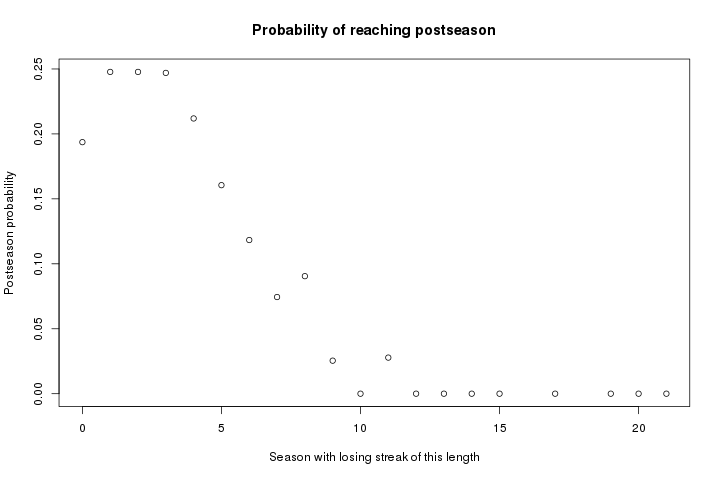
Note the "0" does not mean did not lose at all but instead is a placeholder to mean the average for all seasons.
Good thing they avoided losing ten games instead of nine, unless they managed to stretch it to eleven games. Not much to say here other than don't lose a lot of games if you want to make the postseason.
In conclusion, don't expect good things this year. The team started out with marginal chances for reaching 81 wins and now they're trying to do it in 153 games.
2016 Series 9: Tigers 3, Twins 0
It's getting rather annoying to continue writing "Twins 0" for the series recaps.
The bad:
* Runs prevention. The Tigers averaged 6.3 runs/game.
* Run scoring. The Twins topped out at five runs. Five runs is good but not as a high-water mark. You don't win many games averaging 2.7 runs a game.
* The catchers. Suzuki had a hit and walk on Friday. That was it for both catchers.
The good:
* Duffey. After a short start that wasn't related to performance, Duffey did well enough in his start. Four runs is not good but the peripherals were all fine.
* May. His K/9 did drop over the weekend but it is at 13.8. The walk rate will keep him from being elite but no one can hit his pitches. *Checks his league leading 5 WP* Or know where they're going.
The very good:
* Mauer-Sano-Park. All three raised their OPS over the weekend. That stretch is turning into a solid middle of the order. Mauer leads the team, easily, with 1.1 rWAR. Park is next at 0.6.
2016 Series 5 Recap: Brewers 1, Twins 1
For the first time this year, a sweep was not involved in the series. Once again, the good and bad from the series.
The bad:
- Sano in the outfield. Oof. There will be bad plays, I get that. But Sano needs all the practice he can get. It also would help he he'd mash more. For the season he has a .607 OPS. Thankfully, before the series it was at .535 but it has a long ways to go to.
- Run prevention. Four runs in one game, even if only six innings, is decent but six runs is not. I think it's likely the Brewers would have scored again in game one so letting the bad guys score five plus runs a game is not good.
- Murphy. I want the Murphy era to begin. His OPS is below Punto levels at .279. World Champion Butera at least managed that for a SLG.
The good:
- Scoring. The Twins scored seven runs in six innings and then five more in the next nine. Scoring six runs a game will result in a lot of wins.
- The bullpen before Jepsen. In the three innings from Santana to Jepsen on Tuesday, the bullpen had two hits, one walk, and six strikeouts. Each reliever allowed only a single batter to reach base. Tonkin and O'Rourke did make it interesting by having both of their batters reach in the same inning, but all three outs came on strikeouts.
- Strikeouts. The Twins batters struck out only five times in each game. They also walked six times on Tuesday (only once on Monday).
- Park. He raised his OPS from .657 entering Monday's game to .871. The OBP still needs work at only .313, but the SLG of .558 is great to see.
- Mauer. Mauer back to Mauering.
2016 Series 1 Recap: Orioles 3, Twins 0
Different year, same start. Twins once again are swept in the opening series. It would be easy to say it worked out okay for them last year, but it didn't really. Yes they performed better than expected but they finished three wins behind the Astros. If they instead had swept the Tigers to start the season they would have at least had a playoff game.
I watched barely any of the games and had the radio on for only a plurality of the time so I'm going to fill in the bad and good from the boxscores.
Four negatives from the series:
- Run scoring. Obviously they did better than last year, improving their runs scored by 500%. It is nonetheless difficult to win when you top out at two runs.
- Strikeouts. The batters struck out 35 times but walked only six times. All six walks happened in the second game.
- Dozier not starting well. He finishes the series with a 0.083 OPS. He had one walk in 13 PAs.
- Not pinch hitting for Suzuki in game two. He's the only other player without a hit and he reached base only once.
Three positives from the series:
- Run prevention. Giving up only 3.67 runs a game bodes well for willing. AL teams averaged 4.4 runs a game in 2015.
- Mauer starting well. He had a home run to center and has a nice 1.021 OPS after three games.
- Escobar starting well. He had a double in each game and two in the opener. He has a 1.167 OPS after three games.
March 7, 2016: Spring
Trimmed some bushes and pruned the raspberries yesterday. Still more bushes to trim hack back but I might remove them instead this year. They're too large for where they are but with all the rocks on the soil I've been avoiding outright removal.
February 18, 2016: Stale Coffee
Extra old coffee today.
February 3, 2016: Snow
Snow.



